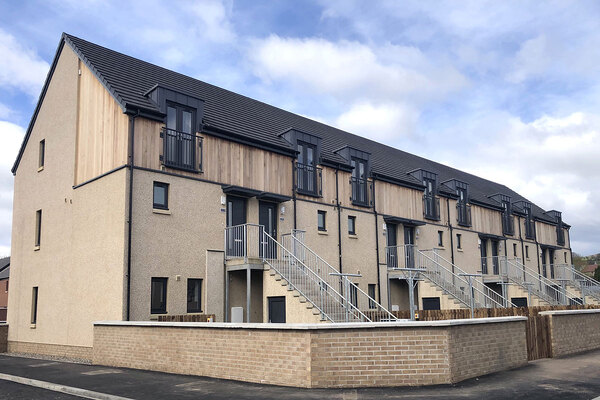You are viewing 1 of your 1 free articles
How can housing associations have insurance certainty?
Insurance claims costs are rising, but there are proactive steps housing associations can take, says Allison Whittington, head of housing and health at insurer Zurich Municipal
It’s safe to say we saw a lot of change in 2024. Around half of the global population participated in elections, resulting in new governments in several countries, including the UK. So it is no surprise that many people feel the world is in a state of constant flux.
It was not just leadership changes that defined 2024. As the world braced for its warmest year on record, we continued to witness extreme and unforgettable weather events. In fact, the 2023-24 season had the highest number of named storms since the Met Office began naming storms.
Against the backdrop of these events, Zurich observed many housing associations making typical insurance claims last year. For example, escape of water claims (eg a burst pipe) remain the most common type of claim made by housing associations.
These types of claims are rising in cost. The average cost of an escape of water claim has more than doubled since 2020. In fact, Zurich claims data shows that the average cost of smaller escape of water claims have increased by 20% in the past 12 months alone.
While no one can predict what to expect as we begin a new year, the global uncertainty experienced over the past 12 months highlights the growing importance of having certainty when it comes to your insurance coverage.
In the past, purchasing an insurance policy may have ranked low on the priority list for many housing associations, and was sometimes only considered near the renewal date. However, we have noticed a shift towards a more proactive approach in securing appropriate insurance.
“In the past, purchasing an insurance policy may have ranked low on the priority list for many housing associations... However, we have noticed a shift towards a more proactive approach”
Capacity in the housing association insurance market has been challenging in recent years, with some insurers exiting. As we kick-start the new year, we hope for a more stabilised market, which would be good news for everyone.
However, even if new insurance providers enter the market, customers will have to choose between a provider that has stayed with them during difficult times and understands the unique challenges they face, or perhaps a more transactional insurer which doesn’t provide as much support all year round.
Here are a few factors housing associations should consider when renewing their insurance this year.
First, engage early. It’s great to see some of our customers engaging with us earlier in the renewal process. This proactive approach allows us to have transparent discussions about their insurance needs, ensuring they have adequate cover in place. As a general guideline, begin to engage with insurers or brokers six months before a policy is due for renewal.
The earlier conversations start, the more support insurers can offer. Engaging with insurers early often allows us to assist with fire safety, flood mitigation and compliance with legislation. It also means that housing associations can prioritise longevity and secure a quality insurance policy with sustainable premiums, enabling them to plan and manage budgets accordingly.
Second, data, data, data. Much of the data housing associations need to provide to insurers is a regulatory requirement. However, it is crucial for insurers to receive high-quality, complete data from customers so they’re able to accurately assess risks and provide the appropriate level of coverage.
Like most insurers, we require customers to provide building-level sums insured, rather than unit level sums insured; reinstatement sums insured, instead of market valuations; and customers to conduct regular reinstatement (re)valuations every three to five years, depending on the asset.
“It is crucial for insurers to receive high-quality, complete data from customers so they’re able to accurately assess risks and provide the appropriate level of coverage”
It has always been the customer’s responsibility to provide a fair representation of their risk, and this can be difficult. This is why we have been working closely with our customers to help them overcome these challenges. We provide templates to assist with internal discussions, attend stakeholder meetings to discuss data requirements and speak at industry events to demonstrate the importance of accurate data.
While many of our customers have made significant efforts over the past year to provide the necessary data for understanding the risks and exposures, there is still more work to be done across the sector. If you don’t have complete data, you may not get the best insurance for your needs, or potentially experience problems at the point of making a claim. Collaboration and partnership are key.
Finally, lean on the insurer’s in-house expertise. We understand many housing associations and local authorities have limited budgets and resources, which is why we often find ways for our wide range of in-house experts to help customers throughout the year.
Allison Whittington, head of housing and health, Zurich Municipal
Sign up for our daily newsletter
Already have an account? Click here to manage your newsletters











